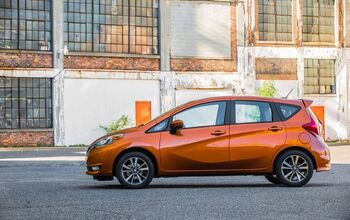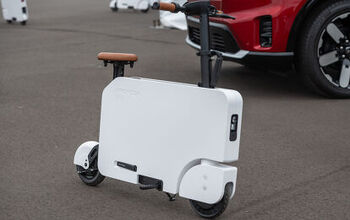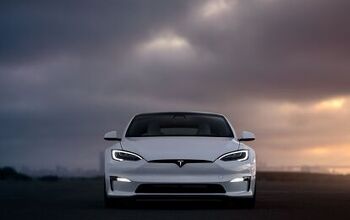Nissan Considers Bringing Its Unusual E-Power Technology to America

The success of Nissan’s e-Power system in the Japanese-market Note hatchback has company brass considering a trans-Pacific trip for the technology.
Should it arrive stateside, e-Power stands to give Nissan an edge in low-priced electrification — potentially undercutting the price of compact hybrid rivals by thousands. Unlike conventional hybrids and plug-in models, Nissan’s system burns gasoline every moment of the drive, despite an electric motor doing all the pulling work.
The novel approach is similar to the Chevrolet Volt’s powertrain, minus the larger battery and plug-in capability. There’s no option of all-electric driving with this system. Instead, a 1.2-liter three-cylinder turns at an optimized 2,500 rpm to generate electricity for the electric motor, feeding a steady slow of it into a compact battery located under the front seats.
Shrinking the battery means lower production costs and a friendlier MSRP. In Japan, a Note (Versa Note in the U.S.) with e-Power retails for about $19,000.
“It is a technology that clearly can fit outside Japan in all the key markets,” Daniele Schillaci, Nissan’s executive vice president of global marketing and sales, told Automotive News at last month’s Shanghai auto show. “We are thinking about moving forward faster on electrification, not only in pure EVs, but also in this e-Power technology.”
The technology first went on sale in Japan last November. Already, the Note e-Power has overtaken the Toyota Prius in sales, providing motivation for the automaker to seek out new markets. While a U.S. introduction isn’t a sure bet, Nissan surely sees it as fertile ground. Not only would the unconventional hybrid battle the Prius, it also has the new Hyundai Ioniq Hybrid to contend with.
“When a technology is successful, it is natural for us to seek something a bit wider,” said Schillaci.
The Note e-Power doesn’t quite reach the lofty fuel economy figures of rival hybrids, though it does offer greatly improved mileage at a lower starting price. Considering the Versa’s U.S. sales remain in the six-figure range, fielding a less-expensive hybrid version with punchier power delivery — Nissan rates the Note e-Power at 187 lb-ft of torque — could prove worthwhile.
[Images: Nissan]

More by Steph Willems
Latest Car Reviews
Read moreLatest Product Reviews
Read moreRecent Comments
- Jkross22 When I think about products that I buy that are of the highest quality or are of great value, I have no idea if they are made as a whole or in parts by unionized employees. As a customer, that's really all I care about. When I think about services I receive from unionized and non-unionized employees, it varies from C- to F levels of service. Will unionizing make the cars better or worse?
- Namesakeone I think it's the age old conundrum: Every company (or industry) wants every other one to pay its workers well; well-paid workers make great customers. But nobody wants to pay their own workers well; that would eat into profits. So instead of what Henry Ford (the first) did over a century ago, we will have a lot of companies copying Nike in the 1980s: third-world employees (with a few highly-paid celebrity athlete endorsers) selling overpriced products to upper-middle-class Americans (with a few urban street youths willing to literally kill for that product), until there are no more upper-middle-class Americans left.
- ToolGuy I was challenged by Tim's incisive opinion, but thankfully Jeff's multiple vanilla truisms have set me straight. Or something. 😉
- ChristianWimmer The body kit modifications ruined it for me.
- ToolGuy "I have my stance -- I won't prejudice the commentariat by sharing it."• Like Tim, I have my opinion and it is perfect and above reproach (as long as I keep it to myself). I would hate to share it with the world and risk having someone critique it. LOL.



































Comments
Join the conversation
A 1.2 3-cylinder engine running constantly at 2500 RPM is probably going to produce around 40 HP (max, probably less). It will NOT be a quiet companion. The only advantage is that it will warm up and stay at a steady temperature.
Prius is a technological marvel beautifully executed by Toyota. Reliable, fairly economical with high bling factor. But from the practical point of view Prius' hybrid drive is too complex and expensive. This system from Nissan is everyman's "hybrid". Expect these to sell for about $16000 in the US. This will be successful.